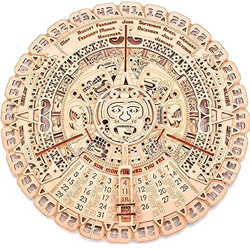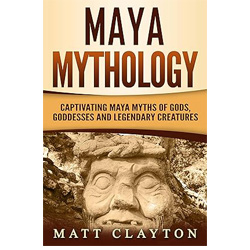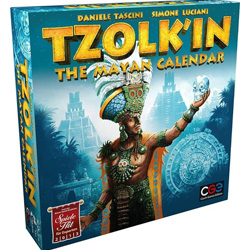- Jewelry
- Inspiration
- Our imagination
- Birthstones
- Celebrating with Eternal Flowers
- Druids and druidesses
- Flower meanings
- History, archeology jewelry
- History and healing properties of metals
- History and healing properties of stone
- Illumination jewelry
- Japanese symbols
- Maya calendar jewelry
- Stone color symbolism
- Stones catalogue
- Wedding anniversaries
- Searches a theme on the site
- Good Deals
- Paintings
- About
- Contact
JEWELRY
- Anklet
- Bracelets
- Brooches
- Cufflinks
- Earrings
- Pendants & Necklaces
- Rings
- Draw your jewelry
- How to clean your jewel
- Metal we used
INSPIRATION
- Our imagination
- Birthstones
- Celebrating with Eternal Flowers
- Druids and druidesses
- Flower meanings
- History, archeology jewelry
- History and healing properties of metals
- History and healing properties stones
- Illumination jewelry
- Japanese symbols
- Maya calendar jewelry
- Stone color symbolism
- Stones Catalogue
- Wedding anniversaries
- Searches a theme on the site
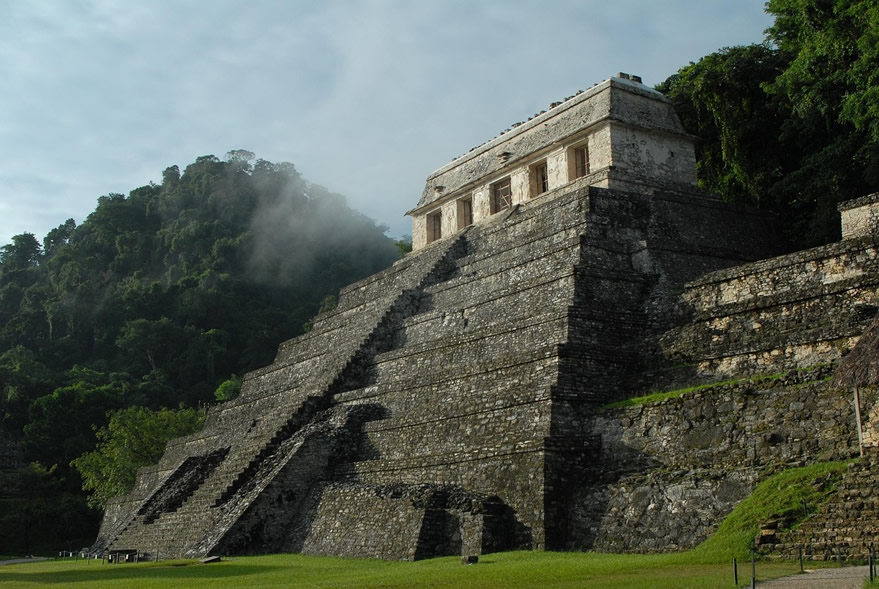
Our sterling silver jewelry line made with the Mayan calendar
We are thrilled to present our collection of personalized jewelry, inspired by the Mayan calendar, an iconic Pre-Columbian civilization of Mexico. This exclusive collection offers you the opportunity to create a unique 925 sterling silver piece that immortalizes a significant date in your life, whether it be your birth, wedding, or any other memorable moment. Each piece is crafted with care and precision to reflect the rich cultural and historical heritage of the Mayans, while capturing the essence of your own story. Treat yourself or a loved one to jewelry that transcends time and borders.
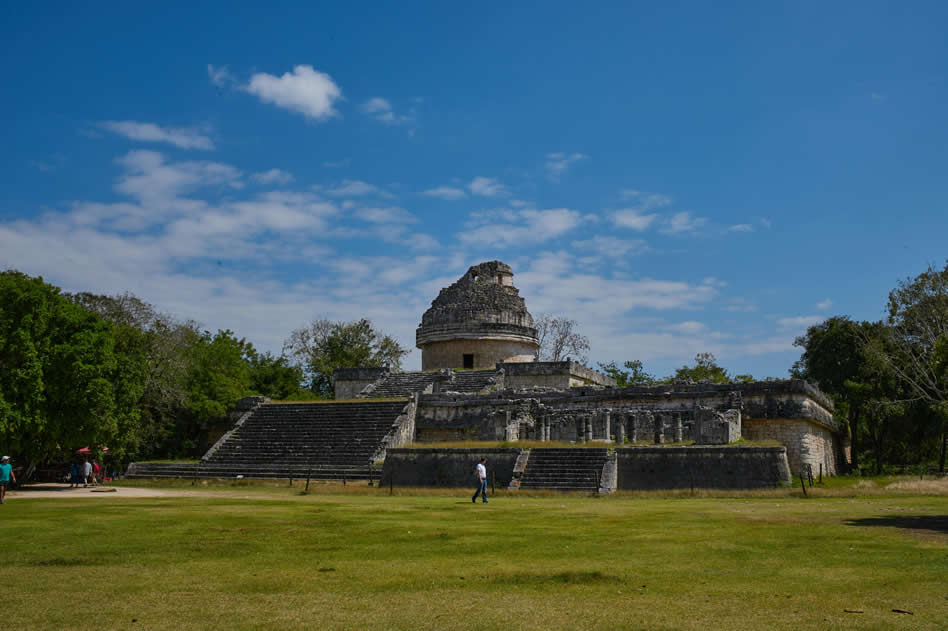
Your date in the Mayan calendar
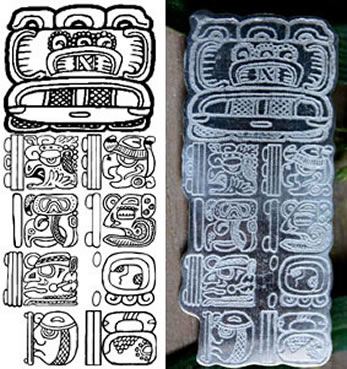
The observation of Mayan glyphs, those complex and fascinating symbols, reveals notable variations due to the vast extent of the Mayan territory and the historical evolution of this civilization. Differences in the representation of glyphs may reflect regional characteristics, linguistic developments, and cultural influences that marked various periods of Mayan history. These variations are not merely artifacts of an ancient culture, but witnesses to the richness and diversity of the Mayan civilization.
To ensure the authenticity and representativeness of the glyphs on our jewelry, we have carefully selected those that faithfully reflect the Mayan calendar systems. However, we understand that every individual has unique preferences and specific desires. Feel free to share your particular needs with us: we are committed to creating a personalized piece of jewelry that reflects you and honors this ancient tradition.
The different types of jewels Maya calendar glyphs
Choosing a silver jewelry theme inspired by the Mayan calendar offers numerous possibilities for ornamentation and personalization. Here are some approaches to incorporating Mayan glyphs into your designs:
Based on the significance the Mayans placed on their various calendar systems, we offer:
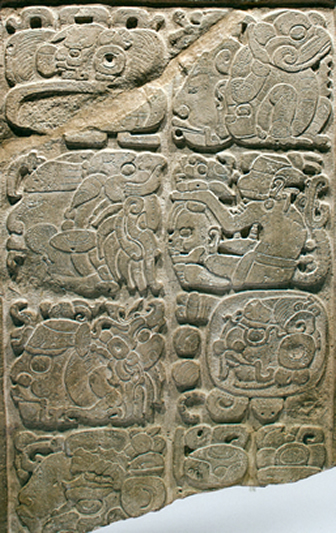
- Unique Tzolk’in Glyph: The sacred 260-day Tzolk’in calendar was essential to daily Mayan life, governing religious ceremonies, agricultural activities, and even personal aspects like personality and destiny. Each day in the Tzolk’in was associated with a specific glyph, representing a deity or cosmic force. By choosing the glyph corresponding to your birthdate in the Tzolk’in, you will wear a piece of jewelry that not only honors Mayan culture but also reflects your own destiny according to this ancient tradition.
- Mayan Calendar Wheel: For a more comprehensive approach, we offer the combination of glyphs from both the Tzolk’in and the Haab calendars. The Haab, a 365-day solar calendar, was used to plan daily activities and agricultural seasons. Combining these two calendars gives you a richer representation of your personal connection to Mayan culture, reflecting both your personality and your relationship with nature and the cosmos.
- Complete Date from the Mayan Long Count: For even more precise personalization, you can opt for a complete date from the Mayan Long Count. This calendar, which followed cycles of 13 baktuns (approximately 5,125 years), offers a detailed view of time. The Long Count is composed of 20 katuns per baktun, 20 tuns per katun, 18 uinals per tun, and 20 days per uinal. While creating a piece of jewelry based on the Long Count requires a larger surface due to the number of glyphs involved, it provides an exhaustive and profound representation of time according to the Mayan tradition.
We offer several examples of designs for your Mayan calendar-inspired jewelry, but our creativity and expertise also allow us to craft unique pieces based on your preferences. Whether you’re looking for a ring, brooch, earrings, pendant, or any other type of jewelry, we are here to create a piece that perfectly reflects your style and personality. Contact us to discuss your ideas and desires; we’re here to help you bring your personalized jewelry to life.
Our sterling silver jewels made with the date of the Maya calendar
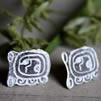
|
Stud earrings with a date of the Tzolkin calendar (1 x 1.3 cm approximately). |
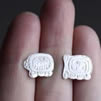
|
Stud earrings with two different dates of the Tzolkin calendar (1 x 1.3 cm approximately). |
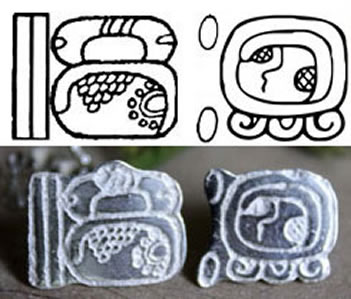
|
Stud earrings with the date of the Mayan calendar wheel (1 x 1.3 cm approximately). |
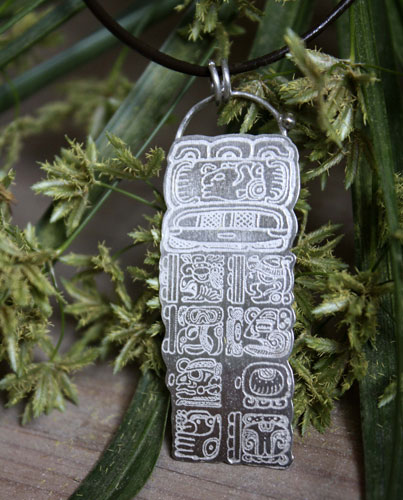
|
Pendant with the long Count date (7 x 2 cm). |
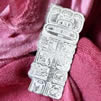
|
Brooch with the long Count date (5 x 2 cm). |
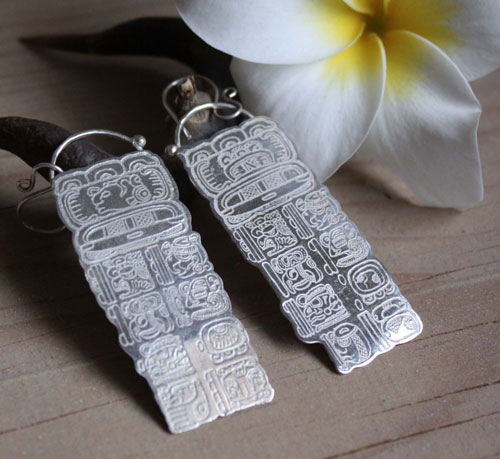
|
Earrings with the long Count date (7 x 2 cm). |
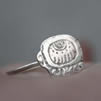
|
Ring with a Tzolkin glyph |
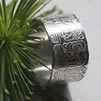
|
Maya Long Count Calendar ring. |
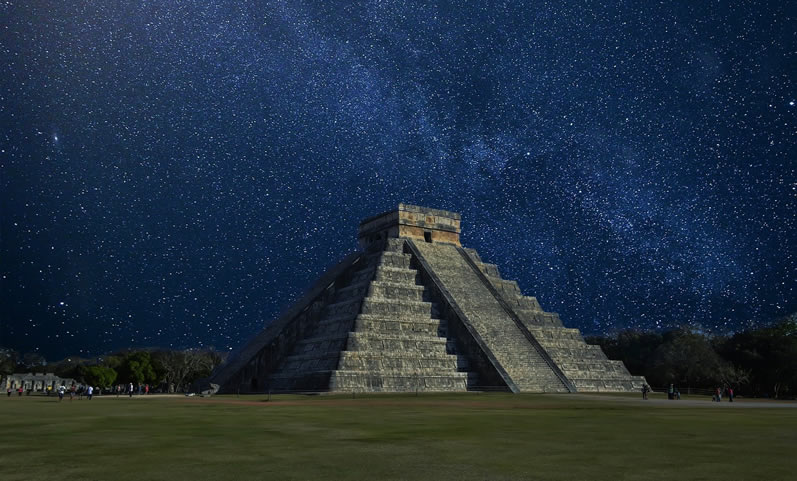
The Mayan calendar, explanations
When we refer to the Mayan calendar, it is important to note that it is more accurate to speak of the "Mayan calendars." This Pre-Columbian civilization from Mexico used a complex system of calendars to structure time, reflecting their sophisticated understanding of celestial and earthly cycles. Among the most well-known are:
- The sacred calendar called Tzolkin, made of 260 days.
- The civil calendar called Haab, of 365 days.
- The long Count calendar.
The calendars were governed by the "scientists" of the time, the priests known as Ah Kin. These scholars were the keepers of mathematical and astronomical knowledge. They had a deep understanding of celestial cycles, eclipses, and planetary movements, allowing them to predict important events with great accuracy. The Ah Kin were respected as intermediaries between the gods and men, and their knowledge was crucial for the planning of religious ceremonies and rites of passage.
The origins of the Mayan calendar are often attributed to the Olmecs, considered the mother civilization. This hypothesis is based on the similarity of the calendrical systems with those of the Aztecs and Mixtecs, suggesting cultural influence and a shared origin. The Olmecs, renowned for their advances in astronomy and mathematics, likely played a role in the development of calendrical systems, which were later refined by the Mayans. However, the Mayans enriched these systems with their own innovations, creating a calendar that is both unique and exceptionally detailed.
The Maya Tzolkin calendar

The term "Tzolk’in" means "count of days" in the Mayan language. This sacred calendar, composed of 260 days called "Kines," is organized into 20 periods of 13 days each. Each period is represented by a glyph, a graphic symbol, and each day is identified by a specific number. The Tzolk’in is a cyclical calendar that repeats every 260 days, forming an endless loop that integrates the concept of time into a continuous cycle.
The Tzolk’in is often associated with two fascinating theories regarding its origins. The first theory suggests that the Tzolk’in is based on the average length of human gestation, which is approximately 260 days. This hypothesis reflects the importance of biology and nature in Mayan culture, highlighting how the Maya integrated their understanding of the natural world into their sacred calendar system. By using the gestation cycle as a reference, the Maya established a calendar that was deeply in harmony with the natural cycles of life.
The second theory links the Tzolk’in to the cycles of the planet Venus, a celestial body of great significance to the Maya. Venus, closely observed by the Maya, was associated with the deity Kukulkan (or Quetzalcoatl among the Aztecs), often linked to fertility, creation, and major celestial events. The movements of Venus were used to predict important events, such as eclipses, and to plan religious ceremonies. This observation of Venus’ cycles illustrates the Maya’s astronomical expertise and their ability to integrate celestial phenomena into their sacred calendar.
As a sacred calendar, the Tzolk’in was crucial for planning not only agricultural activities, such as planting and harvesting, but also auspicious times for hunting and fishing. Its precision and reliability made it an essential tool for organizing daily activities and religious rituals. Additionally, the Tzolk’in was used to define individual destinies. Each day was associated with a specific glyph representing a deity or cosmic force. These glyphs were considered signs of predestination, offering insights into the character and fate of those born under their influence.
The Tzolk’in was not limited to the planning of material activities but was also deeply integrated into the spiritual aspects of Mayan life. The Maya believed that each day brought specific cosmic influences that could affect earthly events, making the Tzolk’in a powerful tool for understanding and harmonizing the relationship between humans and the cosmos.
| Maya name | Characteristic | Glyph |
| Imix | "crocodile". This day is associated with an earth deity, mother of fertility and fecundity. | 
|
| Ik | "wind", "breath that gives life", "spirit". It is associated to the god of water, Chac and to the god of wind, one of the forms of Kukulkan. | 
|
| Akbal | "darkness inside the earth". This Maya day is associated with the Jaguar god, representing the race of the sun during the night. | 
|
| Kan | "ripe corn" or "big flower". It is associated with the god Yum Xak. | 
|
| Chicchan | "snake". This Maya day is associated with the snake god, symbol of the rain and also of fertility. | 
|
| Cimi | "death". It is associated to the god Yum Cimil, the macabre and cruel god of death. | 
|
| Manik | "deer". This Maya day is associated to Buluk Chabtan, god of war and of human sacrifice. | 
|
| Lamat | "Venus" | 
|
| Muluc | "water". This Maya day is dedicated to the god of water and jade. | 
|
| Oc | "trace" or "print". This day is dedicated to the mythical dog Xibalba who accompanies the dead to the underworld. | 
|
| Maya name | Characteristic | Glyph |
| Chuen | "monkey". It is dedicated to the god of scribes and mathematicians. This Maya day is associated with Ah Chicum Ek, god of the lodestar. | 
|
| Eb | "tooth". This Maya day is associated with the negative deity of disasters and floods. | 
|
| Ben | "reed". It is dedicated to the god of the Green Corn, the one who protects the growth of the plant before the harvest. | 
|
| Ix | "jaguar". This Maya day is associated with the Jaguar god, as a night being and a priest. | 
|
| Men | "eagle". This Maya calendar is dedicated to the goddess of the ancient moon, that is to say the waning moon. | 
|
| Cib | "soul". This day is dedicated to the god of bees and beekeepers | 
|
| Caban | "earth". This day of the calendar is associated with the goddess of the young moon, that is to say the waxing moon. | 
|
| Etz-nab | "knife". This day is associated with the god obsidian blade. He runs the cult of sacrifices and self-sacrifices. | 
|
| Cauac | "stormy". This day of the calendar is dedicated to destructive rains. | 
|
| Ahau | this day of the Maya calendar is associated to the lord of the sun, Kinik Ahau | 
|
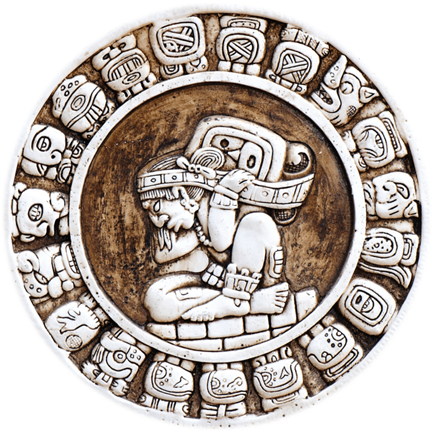
The Mayan Haab calendar
The Mayan Haab calendar, also known as the solar calendar, is a timekeeping system based on the solar year, with remarkable precision for its era. It consists of 365 days divided into 18 months of 20 days each (called Uinals), plus an additional 5-day period known as the "Uayeb." These extra days were considered ominous and were often associated with periods of stagnation or transition. During the Uayeb, the Maya refrained from many daily and ceremonial activities, viewing it as a time for purification and renewal before the start of a new year.
The Haab was a fundamental calendar in both the daily and religious life of the Maya. Each month of the Haab was associated with a specific deity or cosmic force, and each day was identified by a distinct glyph. This association of days with divine symbols allowed the Maya to structure daily events according to perceived cosmic influences.
| Maya name | Characteristic | Glyph |
| Pop | "mat". The patron of this month was the Jaguar. | 
|
| Uo | "black conjunction" | 
|
| Zip | "red conjunction". | 
|
| Zotz | "bat". The patron of this month is the bat. | 
|
| Tzec | "death". This month of the calendar is dedicated to the bees. | 
|
| Xul | "dog". The patron of this month is the sun. | 
|
| Yaxkin | "new sun". The patron of this month is the god Kukulkan. | 
|
| Mol | "water". The patron of this Maya month is the god Chac. It is especially marked by the water purification day. | 
|
| Chen | "black storm". The patron of this month is the goddess of the moon. | 
|
| Yax | "green storm". The patron of this month is the god Chac. | 
|
| Maya name | Characteristic | Glyph |
| Zac | "white storm". The patron of this Maya month is the god of hunting and fishing. | 
|
| Ceh | "red storm" or "the new fire" | 
|
| Mac | "closed". | 
|
| Kankin | "yellow sun" | 
|
| Muan | "owl". This month corresponds to the cocoa day. | 
|
| Pax | "planting time". The patron of this month is the god "Red Puma Father". | 
|
| Kayab | "turtle". | 
|
| Cumkú | "attic". | 
|
| Uayeb | "the sleeper" or "remaining part of the year". | 
|
The wheel of the Maya calendar
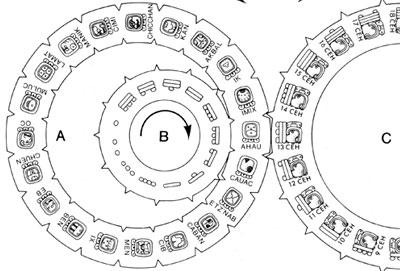
The Tzolk’in and the Haab, though fundamental for timekeeping in Mayan civilization, did not count years independently. This is why their combination was essential for organizing the daily life of the Maya. The integration of these two calendar systems allowed for the tracking of a longer time cycle, often represented by a complex wheel.
The cycles of the Tzolk’in and Haab overlapped to form a period of 52 years, after which both calendars reset to zero. This 52-year cycle is often illustrated by three interconnected gear-like wheels: the smallest (B), representing the days of the Tzolk’in (A), was interlocked with the larger wheel of the Haab (C). This combination created a cycle of 18,980 days, or Kines, which marked the full period before the two calendars realigned.

This 52-year period, known as the "Round of 52 Years," held immense significance in Mayan society. It was celebrated with the "New Fire" ceremony, or "Wayeb," symbolizing renewal and purification. This ceremony marked the end of a 52-year cycle and the beginning of a new one, regarded as an event as momentous as the turn of a century in our own timekeeping system.
The New Fire ceremony was rich in rituals and symbolism. The Maya performed purification rituals to cleanse the negative energies accumulated during the previous cycle. They lit new sacred fires, symbolizing renewal and purification. This celebration was also a time for strengthening political and social alliances between Mayan city-states. Festivities included dances, songs, and ceremonies that reinforced community cohesion and affirmed the bonds between different cities and Mayan kingdoms.
The New Fire did not just mark the passage of time; it also consolidated the political and social structures of Mayan civilization, highlighting the complexity and richness of their culture and beliefs.
The Mayan long Count
The Mayan Long Count is a sophisticated dating system used to record major events with precision that surpasses the Haab and Tzolk’in calendars. This system, which starts from the mythic date 0.0.0.0.0 4 Ahau 8 Cumkú, generally corresponds to August 11, 3114 BCE in the Gregorian calendar. The Long Count was used to mark significant historical events such as the founding of a city-state, the construction of a temple, or the accession of a ruler. It allowed the Maya to track time over much longer periods than other calendars, providing an essential tool for organizing the political, social, and religious life of their civilization.
The end of the Mayan Long Count cycle occurred on December 20, 2012, corresponding to the date 12.19.19.17.19 3 Cuauc 2 Kankin in the Mayan calendar. This date was widely publicized as a prophecy of the end of the world, but for the Maya, it simply marked the end of a major cycle and the beginning of a new era. December 21, 2012 thus marked the start of the 13th Baktun, the date 13.0.0.0.0 4 Ahau 3 Kankin, heralding the beginning of a new period in their complex calendar.
The Long Count is based on a hierarchical numerical structure where each level represents a multiple of 20. The time units of the Long Count are as follows:
| Maya name | Days | Equivalent | Meaning | Glyph |
| Kin | 1 | "time" or "sun" | 
|
|
| Uinal | 20 | 20 Kin | "human being" | 
|
| Tun | 360 | 18 Uinal | "stone" | 
|
| Katún | 7 200 | 20 Tun ou 360 Uinales | "20 years" | 
|
| Baktún | 144 000 | 7 200 Uinales, 400 Tunes ou 20 Katunes | 
|
Other units, multiples of twenty, are also found but were rarely used by the Maya: the piktún, kalabtún, kinchinltún, and alautún. These time units were employed to measure very long periods, such as thousands or millions of years, and were primarily used in mythological or cosmological contexts. For example, the piktún was equivalent to 20 baktuns, or 7,200,000 days. The kalabtún was equivalent to 20 piktúns, or 144,000,000 days. The kinchinltún was equivalent to 20 kalabtúns, or 2,880,000,000 days. Finally, the alautún was equivalent to 20 kinchinltúns, or 57,600,000,000 days, and was used to measure even longer periods, such as cosmic ages or cycles of creation and destruction of the world.
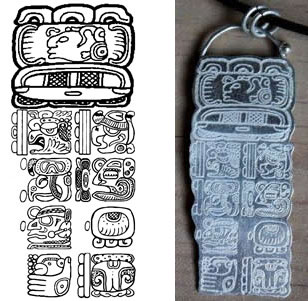
The 9 lords of the night from the Maya calendar
To achieve precise Mayan dating with the Long Count, it is essential to include the 9 Lords of the Night, a fascinating yet often overlooked calendrical cycle. This 9-day cycle is fundamental in Mayan cosmology and is associated with the nocturnal period.
The 9 Lords of the Night are deities each ruling one day of the 9-day cycle. Each lord is associated with a particular aspect of the night and specific attributes that influence the nature of events during their reign. Although detailed information on their exact names and individual attributes is limited, their role in the Mayan timekeeping system is undeniable.
The Lords of the Night are generally referred to by codes ranging from G-1 to G-9 due to the lack of precise names. Their role was to regulate and mark the nocturnal aspects of the Mayan calendar, adding an additional dimension to the understanding of chronology and events. The Maya believed that these Lords of the Night had a significant influence on terrestrial events and cosmic cycles.
| G-1 | 
|
G-2 | 
|
G-3 | 
|
| G-4 | 
|
G-5 | 
|
G-6 | 
|
| G-7 | 
|
G-8 | 
|
G-9 | 
|
The introduction glyphs for the Maya dates
For a complete understanding of dates in the Mayan calendar, it is essential to mention the role of the introductory glyphs, also known as "month heads." These glyphs, specific to each month, were crucial elements for dating and organizing events in the Mayan calendar.
The introductory glyph, or "month head," served to mark the beginning of each month in the calendar. This glyph was generally larger and more elaborate than other glyphs to clearly distinguish it. Due to its size and complexity, it was often placed at the top of the glyph column, visually dominating the other symbols.
Each introductory glyph was a detailed graphic representation of the month it signified. It was often adorned with motifs and symbols associated with that particular month, reflecting the characteristics or deities linked to that period. These decorations might include sacred animals, deities, or ritual objects, adding visual and symbolic richness to the dating.
Introductory glyphs played an important role in organizing Mayan time, allowing priests and scribes to structure the calendars with remarkable precision. They were essential for identifying the month and day, thus facilitating the planning of religious ceremonies, agricultural activities, and social events.
| Ceh | 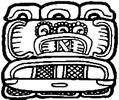
|
Zec | 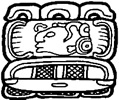
|
Zip | 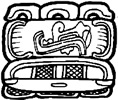
|
In addition to the main calendars like the Tzolk’in and the Haab, the Maya also used other lesser-known but equally sophisticated calendrical systems to meet various practical and ritual needs.
The Lunar Series is one such system. It was used to track the phases of the Moon, providing valuable information on lunar cycles. The Maya observed and recorded these phases to plan agricultural activities, such as planting and harvesting, in alignment with natural cycles. This lunar series also helped determine auspicious times for rituals and ceremonies related to fertility and growth.
The Solar Cycle was based on the equinoxes and solstices. This solar calendar provided a deep understanding of the seasons and changes in light throughout the year. It was crucial for planning agricultural activities according to the seasons and for determining opportune moments for solar ceremonies and festivals associated with the solar cycles.
The Venus Cycle was also of major importance in Maya culture. The Maya closely observed the movements of Venus, which they associated with the deity Kukulkan (or Quetzalcoatl in Aztec culture). Venus phases were used to predict significant astronomical events, such as eclipses, and to plan ceremonies and social events. Venus was often seen as a divine messenger, and its cycle greatly influenced Maya ritual practices and religious beliefs.
All these lesser-known calendrical systems were integrated into the Maya priests' divination system, who used this data to predict future events and make important decisions. The astronomical and calendrical knowledge of the priests, as provided by these systems, was essential for managing community activities and maintaining harmony with natural and cosmic cycles.
Here are some products we found interesting or captivating on the theme of the Mayan calendar:

